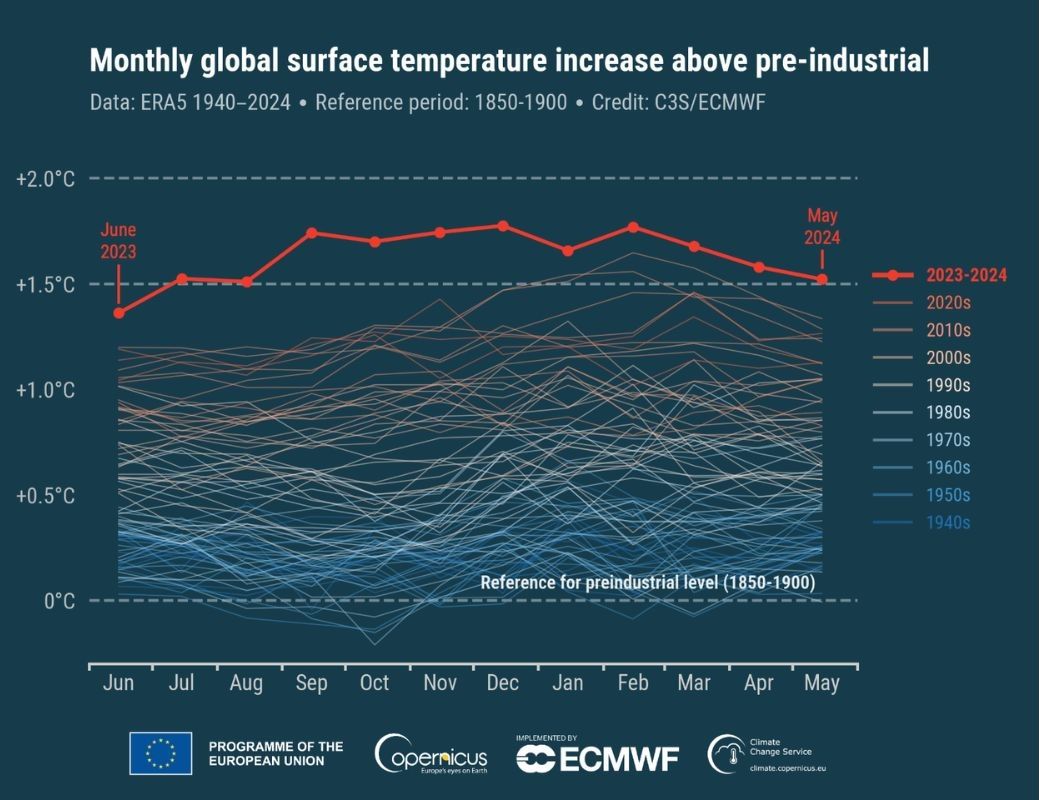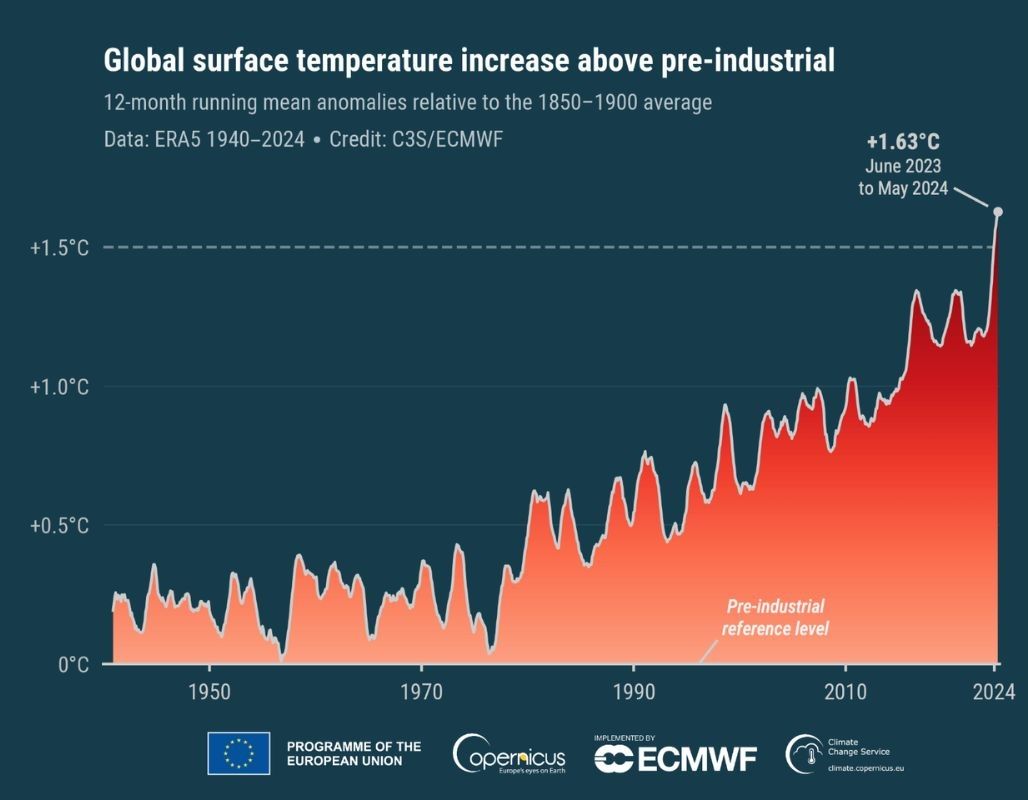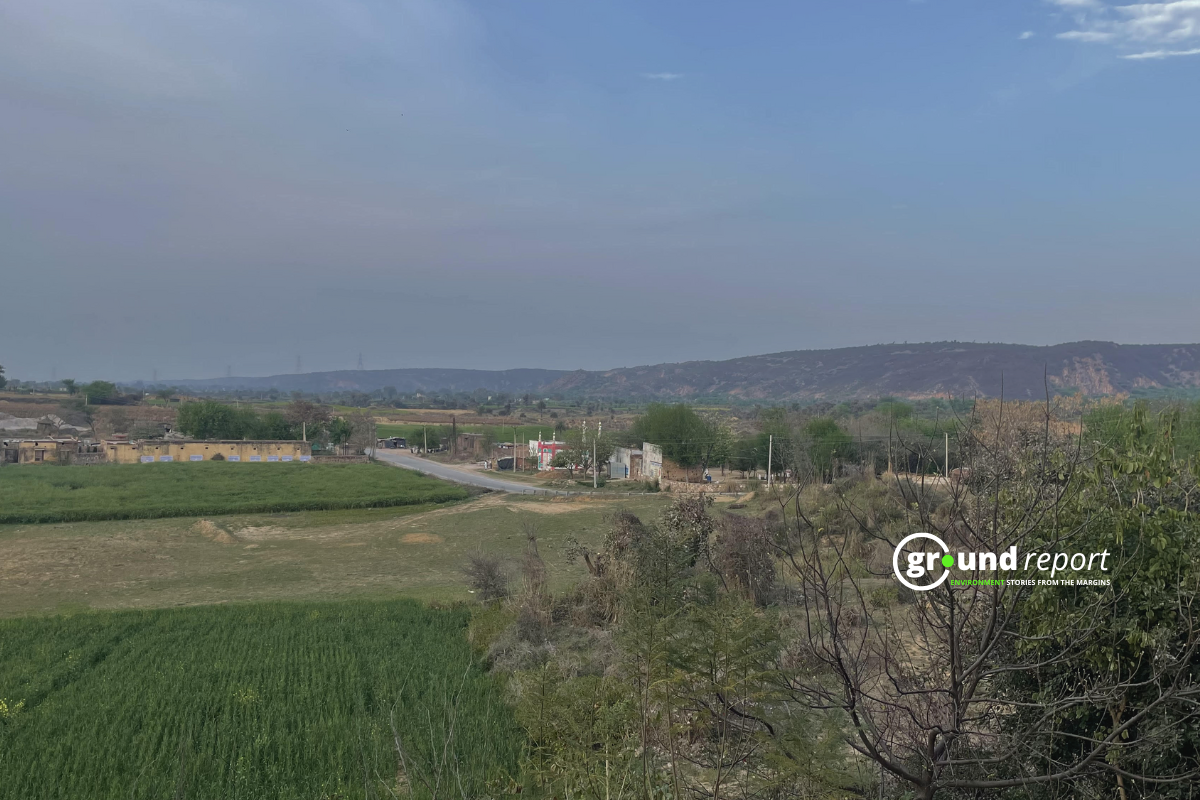The unrelenting rise in global temperatures due to human-caused climate change hit another alarming milestone in May. The world had its hottest May on record, marking a full year – 12 consecutive months – of unprecedented, record-shattering global heat.
May 2024 Sets New High
The European Union’s Copernicus Climate Change Service data shows the global average surface air temperature in May was 0.65°C (1.17°F) above the 1991-2020 average. It was the 12th consecutive month of record-breaking global temperatures for that month, based on the agency’s ERA5 data from 1940.
“In May 2024, global temperatures hit 1.63°C above pre-industrial levels. This record-breaking trend is difficult to comprehend.”
2023 is the hottest year globally since records began in the mid-1800s. The new temperature figures arrive with a dire report on future climate projections.
The World Meteorological Organization (WMO) and the UK Met Office warn in the Annual to Decadal Climate Prediction Update of a 50% chance that one of the next five years (2024-2028) will be hotter than 2023, the hottest year on record globally.
Carlo Buontempo, director of the Copernicus Climate Change Service (C3S), said, “It’s shocking but not surprising to reach this 12-month record heat streak. While it will eventually be interrupted, the climate change signature remains, with no sign of a trend change.”

Buontempo stated that these record temperatures will seem cool if greenhouse gas emissions are reduced. The current planetary warming is unparalleled in human history.
“We’re in unprecedented times, but we have unprecedented climate monitoring skills to inform our actions,” he said. “This string of hottest months will be remembered as comparatively cold, but if we stabilize greenhouse gas concentrations very soon, we might return to these ‘cold’ temperatures by the end of the century.”
2023 is the hottest year on record globally, supported by new temperature figures. The World Meteorological Organization (WMO) has released a dire new report on future climate projections.
Temporary breaches of 1.5°C likely in next 5 years
According to the WMO report, there is a 47% chance that the 2024-2028 period will exceed 1.5°C.
UN Secretary-General António Guterres said, “We are playing Russian roulette with our planet. We need an exit ramp off the highway to climate hell. The good news is we have control of the wheel. The battle to limit temperature rise to 1.5 degrees will be won or lost in the 2020s – under today’s leaders.”
The 1.5°C threshold refers to the Paris Agreement’s goal of limiting global temperature rise to avoid the worst impacts of climate change. While temporary breaches wouldn’t permanently derail the target, climate scientists warn that continued fossil fuel emissions are rapidly pushing irreversible warming.
“Behind these statistics lies the bleak reality that we are way off track to meet the goals set in the Paris Agreement,” said WMO Deputy Secretary-General Ko Barrett. “We must urgently do more to cut greenhouse gas emissions, or we will pay an increasingly heavy price.”
Barret added that temporary breaches of 1.5°C don’t mean the target is permanently lost. He also stated, “WMO is sounding the alarm that we will exceed the 1.5°C level more frequently.”
Research meteorologist Jared Rennie, with NOAA’s National Centers for Environmental Information (NCEI), said, “These records keep breaking each month, with no sign of slowing down.” “Right now, there’s a 61% chance 2024 will be the warmest year on record globally, and it’s almost certain it will be a Top 5 year.”
June expected to be warmest
The only break from the unprecedented heat may come in the next couple of months as the new La Niña pattern in the Pacific cools some areas temporarily. But that could change later in the summer and fall.

Hausfather said, “June is expected to be the warmest June on record globally. Air temperatures this high before summer have never been seen in the Northern Hemisphere.”
He said,
“La Niña’s influence reduces global temperatures with a lag. The anomalous heat emerges toward the end of an El Niño event like last year, not at the beginning.”
The latest temperature data shows that no region of the planet was spared from excessive heat in May. Some areas, like India, experienced severe heat waves contributing to a soaring death toll.
Deaths from heat wave in India
Authorities in India reported 25,000 suspected heat stroke cases and 56 confirmed deaths from heat-related causes from March through May, according to government figures cited by local media. Madhya Pradesh recorded over 5,000 heat stroke cases and 14 confirmed deaths – the highest in the nation.
At least 20 people died from sunstroke in Odisha over three sweltering days last week. Dozens more heat-related deaths are under investigation. Delhi and Rajasthan saw temperatures above 50°C (122°F).
“This extreme heat would have been impossible without human-caused climate change,” said Deepti Singh, an climate scientist at Washington State University. “As the planet continues warming from fossil fuel emissions, we can expect more and worse heat waves each year across India.”
Early monsoon rains in southern India provided temporary relief, but extreme heat persists in central and northern regions. Meteorologists warn of more scorching days due to the late arrival of cooling patterns.
“The transition from El Niño to La Niña typically has a lagged influence on global average temperatures,” said Michael Rawlins, director of the Climate System Research Center at UMass Amherst. “This means the anomalous heat usually emerges toward the later part of the El Niño, not at the beginning like last year.”
Rawlins added that the recent records are alarming signs that climate models may be underestimating the rapid pace of global warming from human activities.
He said,
“We do not fully understand how the various factors are contributing to the sharp uptick in heat in recent years.'”
Last month, extreme heat fueled wildfires in Spain, contributed to glacial melting in the Alps, worsened drought in North America, and stoked an early start to the Southwest U.S. wildfire season.
Climate change has increased the frequency, duration, and intensity of heat waves worldwide. According to a study, simultaneous heat waves in multiple regions have become 2-7 times more likely in recent years.
Earth’s fever keeps raging
Guterres said, “Earth’s fever keeps raging,” reacting to the record May temperatures. “Our planet is trying to tell us something. But we don’t seem to be listening. We’re shattering global temperature records and reaping the whirlwind. It’s climate crunch time. Now is the time to mobilize, act and deliver.”
Global warming is outpacing scientific projections as carbon emissions from burning fossil fuels and other human activities continue to release more heat-trapping gases. In 2023, the hottest year on record surpassed the previous one by 0.26°C and was 1.27°C above the 1850-1900 pre-industrial baseline.
In May 2024, extreme heat pushed the 12-month average temperature 1.63°C above 19th century levels. This likely breached the 1.5°C warming threshold set by the Paris Climate Agreement.
Scientists warn that the window to enact enough emissions cuts to hold warming to 1.5°C – or below the 2°C guardrail in Paris – is rapidly closing. To achieve that, global greenhouse gas emissions must be cut by 50% this decade and reach net-zero by mid-century.
“This 12-month record-breaking heat shows that climate change is an existential threat,” said Henri Clausen, a climate scientist at the University of Nottingham. “The world is facing an unavoidable climate catastrophe without immediate aggressive mitigation and adaptation measures.”
“We are rapidly depleting the time to secure a safe climate future for our children and grandchildren,” Clausen added. “Today’s decisions will echo across generations.”
Keep Reading
Part 1: Cloudburst in Ganderbal’s Padabal village & unfulfilled promises
India braces for intense 2024 monsoon amid recent deadly weather trends
Support us to keep independent environmental journalism alive in India.
Follow Ground Report on X, Instagram and Facebook for environmental and underreported stories from the margins. Give us feedback on our email id greport2018@gmail.com.
Don’t forget to Subscribe to our weekly newsletter, Join our community on WhatsApp, and Follow our YouTube Channel for video stories.










